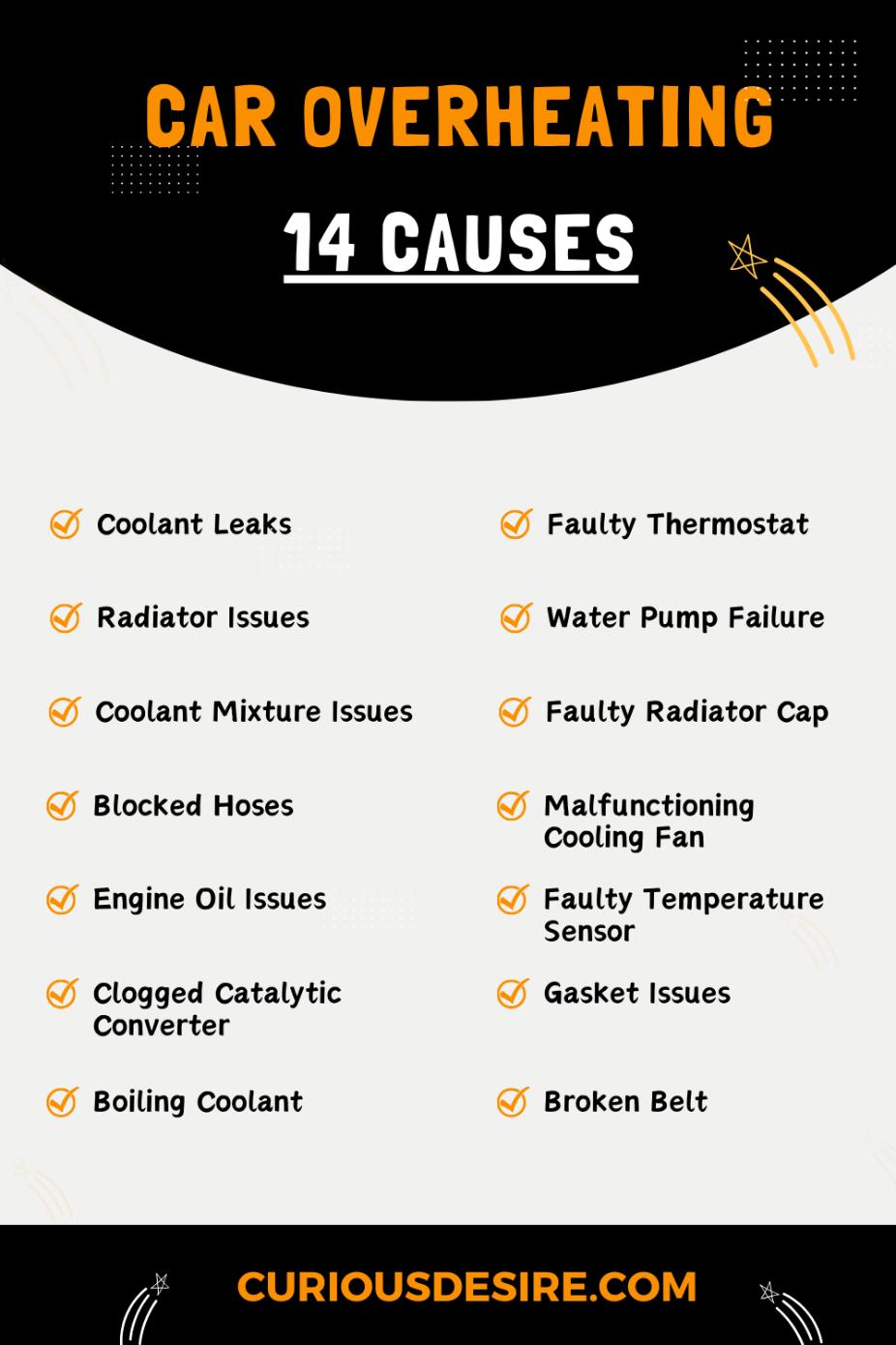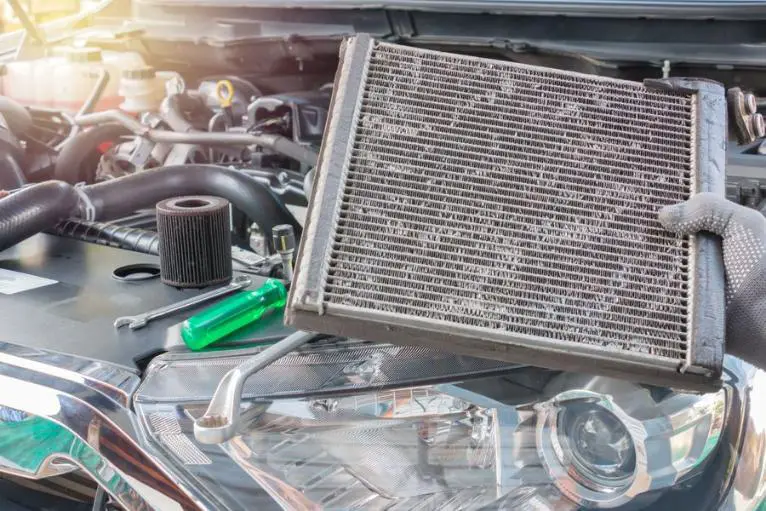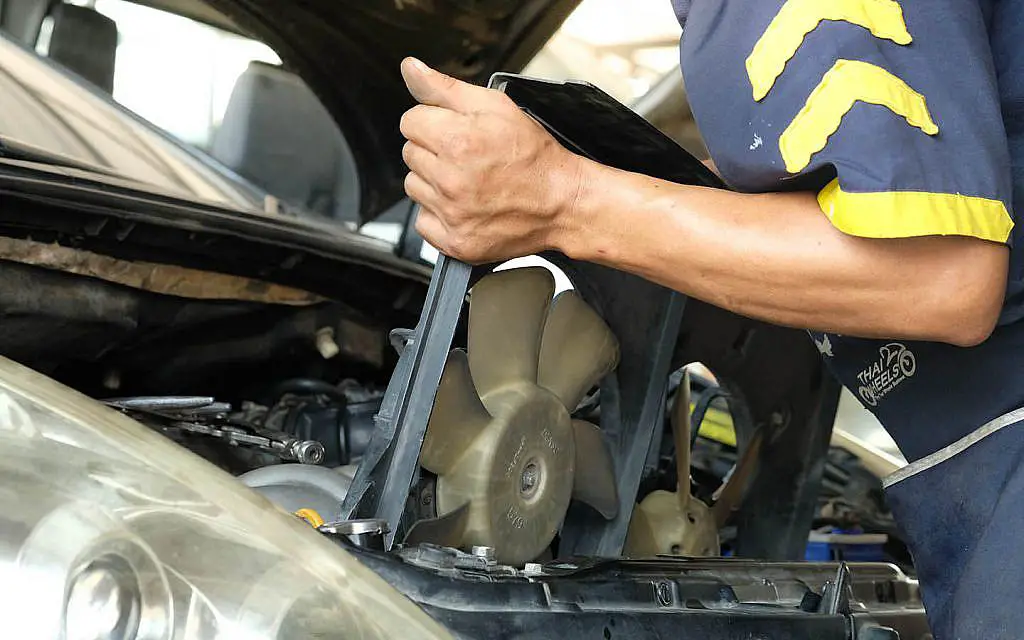Car overheating is a serious concern that can lead to engine damage if not addressed quickly.
This article will examine the causes behind engine overheating, providing insights into the cooling system’s complexities and offering practical information for identification.
Let’s get started.
Here are the top 5 causes of car overheating:
- Faulty Thermostat
- Water Pump Failure
- Coolant Leaks
- Coolant Mixture Issues
- Malfunctioning Cooling Fan
[toc]

Car Overheating Causes FAQs
1. What are 3 simple things to check if your car is overheating?
- Coolant Level: Ensure that the coolant level in the radiator and reservoir is sufficient. Low coolant levels can lead to overheating.
- Radiator Fan: Check if the radiator fan is functioning properly. If it’s not working, the engine may not cool efficiently, especially when the car is stationary.
- Thermostat: Inspect the thermostat for proper operation. A malfunctioning thermostat can cause the engine to overheat by either not allowing coolant to flow or not regulating the temperature correctly.
2. How do you fix a car that overheats?
To address an overheating car, you can take several steps. First, turn off the engine and let it cool down. Once the engine is cool, check the coolant level and add more if necessary.
Verify that the radiator fan is working. If the issue persists, a faulty thermostat, water pump, or clogged radiator could be the culprit, requiring professional attention.
In extreme cases, it might be necessary to tow the car to a mechanic for a thorough inspection.
3. How can I stop my car from overheating?
To prevent your car from overheating, adhere to regular maintenance schedules. Ensure that the coolant level is adequate and that the cooling system components, such as the radiator and hoses, are in good condition.
Keep an eye on the engine temperature gauge, and if you notice any signs of overheating, address them promptly. Additionally, avoid driving with low coolant levels or in extreme temperatures without proper cooling system functioning.
4. What causes overheating in a car?
Overheating in a car can be caused by various factors, including low coolant levels, a malfunctioning thermostat, a faulty water pump, radiator issues, cooling fan problems, or a clogged radiator.
Additionally, engine-related problems like a blown head gasket or a malfunctioning temperature sensor can contribute to overheating.
5. Can I use water instead of coolant?
While water can be used temporarily in an emergency, it is not recommended as a long-term coolant substitute. Water lacks the anti-corrosive and anti-freezing properties of coolant, which can lead to rust and freezing in colder temperatures.
Coolant also helps in preventing overheating more effectively than water alone.
6. How do you diagnose a car overheating problem?
Diagnosing a car overheating problem involves checking the coolant level, inspecting the radiator, testing the thermostat, examining the water pump, and ensuring the proper functioning of the cooling fan.
If these components are in good condition and the issue persists, a professional mechanic may need to inspect for more complex problems, such as a blown head gasket or a malfunctioning temperature sensor.
7. Can low oil cause overheating?
Yes, low oil levels can contribute to overheating. Engine oil not only lubricates moving parts but also helps in dissipating heat.
Without sufficient oil, friction increases, leading to higher temperatures. Regularly check and maintain proper oil levels to prevent overheating issues.
8. Can a car recover from overheating?
In some cases, a car can recover from overheating if the issue is addressed promptly.
Turning off the engine, allowing it to cool down, and addressing the root cause, such as low coolant or a malfunctioning component, can prevent permanent damage.
However, repeated episodes of overheating may cause long-term damage to the engine.
9. What are two signs of overheating?
Two common signs of overheating are an elevated engine temperature gauge on the dashboard and steam coming from the engine bay.
If you observe these signs, it’s essential to address the issue promptly to prevent further damage.
10. What are the three stages of overheating?
The three stages of overheating are mild, moderate, and severe. In the mild stage, the engine temperature rises, and warning indicators may activate.
In the moderate stage, steam may start to emerge, and engine performance may be affected.
Severe overheating can lead to irreversible damage, including a warped cylinder head or a blown head gasket.
11. What are the symptoms of internal heat?
Internal heat in a car may manifest as increased engine temperature, warning lights on the dashboard, reduced engine performance, and, in severe cases, steam or smoke coming from the engine compartment.
These symptoms indicate a malfunction in the cooling system that needs immediate attention.
12. What is a physical indicator of overheating?
A physical indicator of overheating is steam or smoke emanating from the engine bay.
This is a clear sign that the engine is generating excessive heat, and immediate action is required to prevent further damage.
13. Can I drive my car if it’s overheating?
Driving a car that is actively overheating is not recommended. Continuing to drive can cause severe damage to the engine.
It’s advisable to pull over, turn off the engine, and allow it to cool before attempting to address the underlying issue or seeking professional assistance.
14. Can overheating damage a car engine?
Yes, overheating can cause significant damage to the car’s engine. Continuous exposure to high temperatures can lead to warped cylinder heads, a blown head gasket, and damage to other engine components.
Timely intervention is crucial to prevent long-term and expensive repairs.
15. Why is my car overheating but the coolant is full?
Even if the coolant level is full, your car may still overheat due to issues such as a malfunctioning thermostat, a faulty water pump, a clogged radiator, or a malfunctioning cooling fan.
These problems can impede the proper circulation of coolant, leading to overheating despite a full coolant reservoir.
16. Is it bad to drive your car when it says it’s overheating?
It is not advisable to drive your car when it indicates overheating. Continuing to drive can exacerbate the issue, causing severe engine damage.
Pull over, turn off the engine, and allow it to cool down before investigating and addressing the cause of overheating.
17. Can low oil cause overheating?
Yes, low oil levels can contribute to overheating. Engine oil not only lubricates moving parts but also helps in dissipating heat.
Without sufficient oil, friction increases, leading to higher temperatures. Regularly check and maintain proper oil levels to prevent overheating issues.
18. How do I know if my water pump is bad?
Signs of a bad water pump include coolant leaks, a whining noise from the pump, overheating, and visible wobbling or play in the pump’s pulley.
If you observe these symptoms, it’s advisable to have the water pump inspected and replaced if necessary.
19. How can I cool my engine faster?
To cool your engine faster, turn off the air conditioning, open the windows, and turn on the heater to transfer heat away from the engine.
If safe to do so, you can also pop the hood to allow heat to dissipate more quickly. Additionally, avoid aggressive driving and pull over if the situation persists.
20. Does AC make the engine hotter?
The air conditioning system can add load to the engine, causing it to work harder and generate more heat.
However, modern vehicles are designed to manage this load effectively, and the impact on engine temperature is typically minimal under normal operating conditions.
21. Does AC cool the engine?
The air conditioning system itself does not cool the engine. Its primary function is to cool the passenger compartment.
In some cases, the AC compressor may add a slight cooling effect to the engine, but it is not a significant factor in regulating engine temperature.
22. Should I turn off the AC if my car is overheating?
Yes, turning off the air conditioning can help reduce the load on the engine and alleviate overheating.
If your car is experiencing overheating issues, it’s advisable to turn off the AC, open windows, and turn on the heater to aid in cooling the engine until you can address the root cause of the problem.

